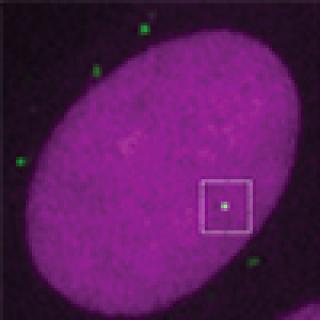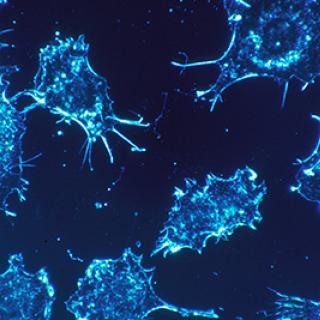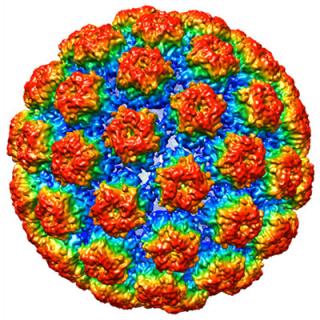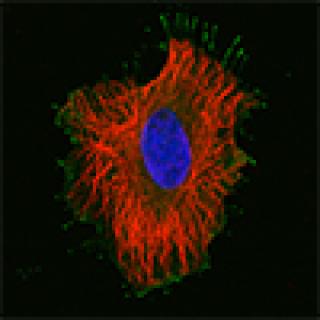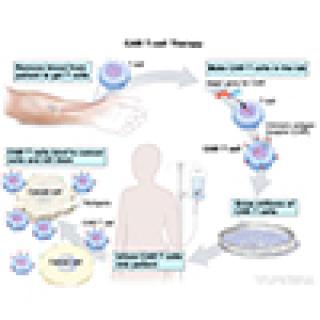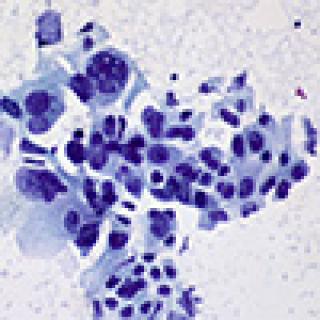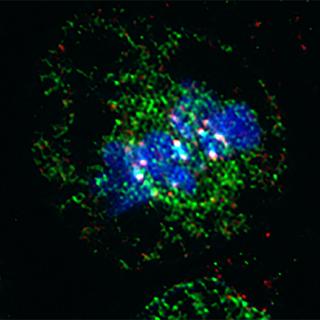Our Discoveries
New study overturns conventional understanding of how HIV infection occurs
Researchers have succeeded in imaging where and when the protective coating that surrounds HIV is disassembled, a critical step in the viral replication process. Their observations show that the virus keeps its protective coating after entering the nucleus of a cell and then begins replicating, which is counter to what most scientists have thought for decades.
Read MorePotent new LDHI inhibitor disrupts tumor growth in mice
Researchers have identified a potent LDH inhibitor, which can disrupt the energy production of tumors in mice. After exposure to the LDH inhibitor, the cancers cells began to rely on a different form of energy production, which could also be disrupted by using a second drug. Combining the two drugs had a potent anti-cancer effect.
Read MoreResearchers identify protein essential for assembling cells’ energy-producing machine
CCR researchers have discovered that the protein Bcs1 acts as the element that facilitates the transport of iron-sulfur protein, or ISP, across the inner membranes of mitochondria, the cell’s power plant. ISP is needed for the assembly of Complex III, a key element of the respiratory chain, which ensures that nutrients are converted to ATP, energy that cells need.
Read MoreNew tool catalogs thousands of previously unknown viruses
In the quest to study two cancer-causing viruses, a team of researchers has uncovered a wealth of previously unknown viruses, some with very unusual properties. The work could one day help identify viruses associated with cancer and other disease.
Read MoreT-cell stimulation could be used to target cancers with common TP53 gene mutations
Researchers in the Center for Cancer Research have found that circulating lymphocytes can be stimulated in the laboratory to generate cells that can recognize TP53 gene mutations. Mutations to the TP53 gene are found in about 40 percent of all cancers, making this process a potentially significant step forward in fighting many types of cancer.
Read MoreNew technology elucidates how metabolites interact with proteins to drive cancer
Acyl-coenzyme As (CoAs) are a group of small molecule metabolites that are the building blocks and chemical energy source for all living organisms. Recent evidence indicates that metabolites such as acyl-CoAs can also interact with proteins to drive the development of cancer.
Read MoreSide effects of CAR T-cell therapy are dramatically reduced with new receptor
A new immunotherapy for lymphoma has been found to cause lower levels of neurologic toxicity than other T-cell therapies for lymphoma. The findings come from the first clinical test of a CAR T-cell therapy using a new anti-cancer T-cell receptor developed in the Center for Cancer Research.
Read MoreGenomic profiles of lung cancer differ based on ancestry
An analysis of tumors from people with non-small cell lung cancer by researchers at the Center for Cancer Research revealed differences in genomic instability and homologous recombination deficiency in tumors from people with African ancestry compared to those with European ancestry. These findings highlight ancestry-related differences in tumor biology and may help improve our understanding of the higher incidence of cancer burden and high mortality observed in African Americans.
Read MoreProtein affecting cell division hints at a way to overcome drug resistance
Researchers have uncovered the way in which a protein, called CLR4, helps complete the cell division process. The mechanism could potentially be harnessed to overcome resistance of cancer cells to chemotherapy drugs such as paclitaxel.
Read MoreBinding preferences of Ras and Raf yield clues for developing targeted cancer therapies
Using living cells, researchers in CCR have found that a set of enzymatic proteins, known as Raf kinases, have differing affinities in how they bind to a class of cancer-related proteins, known as the Ras GTPases. This could offer new strategies for developing more effective targeted therapies.
Read More